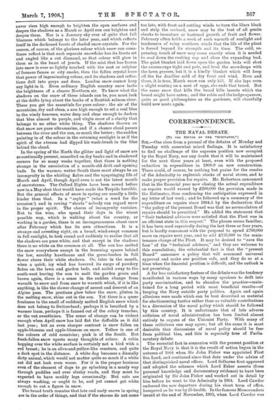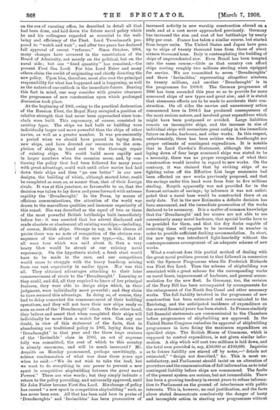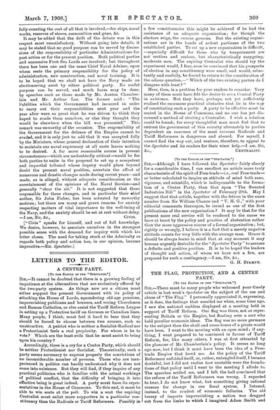CORRESPONDENCE.
THE NAVAL DEBATE.
[TO TEE EDITOR OW THE 08m:revolt.- j Sin,—One rises from a perusal of the debates of Monday and Tuesday with somewhat mixed feelings. It is satisfactory to find no challenge of the supreme position now occupied by the Royal Navy, nor any doubt that it will be maintained for the next three years at least, even with the proposed reduction in expenditure in 1908-9 on new construction. There could, of course, be nothing but praise for the resolve of the Admiralty to replenish stocks of naval stores, and to make proper provision for repairs. Mr. Robertson announced that in the financial year now closing the actual expenditure on repairs would exceed by £200,000 the provision made in the Estimates, thus confirming the anticipation expressed in my letter of last week ; and he followed up a summary of the expenditure on repairs since 1904-5 by the declaration that "the policy of the present Board was that no accumulation of repairs should be permitted." He added the statement that " their technical advisers were satisfied that the Fleet was in an efficient state in this respect." The phrase seems familiar; it has been used repeatedly during the last three or four years, but is hardly consonant with the proposal to spend £700,000 more on repairs next year, and to add £135,000 to the main- tenance charge of the Fleet. It may be desired to " save the face" of the "technical advisers," and they are welcome to this consolation; the substantial fact is that the " present Board" announce a policy that will command universal approval and make our position safe, and they do so at a time when the financial position is difficult, and the outlook is not promising.
A far less satisfactory feature of the debate was the tendency manifested in various ways by many speakers to drift into party recrimination, and to abandon the practice—main- tained for a long period with most beneficial results—of keeping the Navy outside party politics. Again and again allusions were made which can be best described as material for electioneering tactics rather than as valuable contributions to a discussion of the naval policy which should be followed by this country. It is unfortunate that of late adverse criticism of naval administration has been limited almost entirely to organs of the Unionist Party. With many of these criticisms one may agree; but all the same it is most desirable that discussions of naval policy should be free from political bias, and this is especially true of Parlia. mentary debate.
The essential fact in connexion with the present position of the Royal Navy is that it is the result of action begun in the autumn of 1904 when Sir John Fisher was appointed First Sea Lord, and continued since that date under the advice of that distinguished naval officer. Lord Selborne first approved and adopted the schemes which Lord Esher asserts (from personal knowledge and documentary evidence) to have been originated by Sir John Fisher and worked out in detail by him before he went to the Admiralty in 1904. Lord Cawdor endorsed the new departure during his short term of office, hampered as he was by ill-health. In the famous Memorandum issued at the end of November, 1905, when Lord Cawdor was on the eve of vacating office, he described in detail all that had been done, and laid down the future naval policy which he and his colleagues regarded as essential to the well- being and efficiency of the Fleet. Lord Tweedmouth pro- posed to "watch and wait"; and after two years has declared full approval of recent "reforms." Since October, 1904, many changes have occurred in the constitution of the Board of Admiralty, not merely on the political, but on the naval side ; but one " fixed quantity" has remained,—the present First Sea Lord. For him Lord Esher and many others claim the credit of originating and chiefly directing the new policy. Upon him, therefore, must also rest the principal responsibility for what has happened and is happening, as well as the nature of our outlook in the immediate future. Bearing this fact in mind, one may consider with greater clearness the programme of new construction upon which prolonged discussion took place.
At the beginning of 1905, owing to the practical destruction of the Russian Fleet, the Royal Navy occupied a position of relative strength that had never been approached since iron- clads were built. This supremacy, of course, consisted in existing types. The ships we had built or building were individually larger and more powerful than the ships of other navies, as well as a greater number. It was pre-eminently a period when we should have paused in laying down new ships, and have devoted our resources to the com- pletion of ships in band and to the thorough repair of existing ships. We could build more rapidly and in larger numbers when the occasion arose, and, by con- tinning the policy that had been followed for many years with great advantage, could wait until other navies had laid I down their ships and then " go one better" in our new designs, the building of which, although started later, could be completed as soon as, or sooner than, that of their foreign rivals. It was at this juncture, so favourable to us, that the decision was taken to lay down and press forward with extreme rapidity the Dreadnought.' In the Press, by means of officious communications, the attention of the world was drawn to the marvellous qualities and immense superiority of this vessel. She was described as the equal of two or three of the most powerful British battleships built immediately before her: it was asserted that her advent disclassed and made obsolete or obsolescent all existing warships,—including, of course, British ships. Strange to say, in this chorus of praise there was no note of recognition of the obvious con- sequence of the advent of the new type,—viz., that if all were true which was said about it, then a very heavy blow would be struck at our existing naval supremacy. On the hypothesis stated, a fresh start would have to be made in the race, and our competitors would cease to struggle with the heavy handicap arising from our vast superiority in earlier types. Nor was this all. They obtained advantages attaching to their later commencement of rivals to the Dreadnought.' Learning as they could, and did, all they required to know of her principal features, they were able to design ships which, in their judgment, were individually more powerful ; and they claim to have secured this advantage. In doing so, of course, they bad to delay somewhat the commencement of their building operations, and they will not have their new ships ready so soon as ours of the Dreadnought' class. On the other hand, they believe and assert that when completed their ships will individually be more than a match for ours. Can any one doubt, in view of this statement of the facts, that in abandoning our traditional policy in 1905, laying down the Dreadnought ' in that year and the three huge cruisers of the ' Invincible' class in 1906, an act of supreme folly was committed, the cost of which to this country is already enormous, and will be ranch• increased ? Mr. Asquith on Monday pronounced, perhaps unwittingly, a solemn condemnation of what was done three years ago when he said :—" We do not wish to take the lead, but we want to do everything in our power to prevent a new spurt in competitive shipbuilding between the great naval Powers." These are wise words ; but they simply indicate a return to the policy prevailing, and universally approved, until Sir John Fisher became First Sea Lord. His change of policy has caused " a new spurt in competitive shipbuilding" such as has never been seen. All that has been said here in praise of 'Dreadnoughts' and 'Invincibles' has been provocative of increased activity in new warship construction abroad on a scale and at a cost never approached previously. Germany has increased the size and cost of her battleships by nearly fifty per cent. France has taken a similar course, but started from larger unite. The United States and Japan have gone up to ships of twenty thousand tons from those of about sixteen thousand tons. Italy is contemplating the building of ships of unprecedented size. Even Brazil has been tempted into the same course,—little as that country can afford ships costing roughly two millions sterling when equipped for service. We are committed to seven ' Dreadnoughts' and three representing altogether nineteen to twenty millions, and another Dreadnought' is in the programme for 1908-9. The German programme of 1906 has been amended this year so as to provide for more armoured ships of new types and great size; and it is stated that strenuous efforts are to be made to accelerate their con- struction. On all sides the unwise and unnecessary action commenced here in 1904-5 has produced consequences of the most serious nature, and involved great expenditure which might have been postponed or avoided. Large liabilities remain on incomplete ships, and the increase in size of individual ships will necessitate great outlay in the immediate future on docks, harbours, and other works. In this respect, unfortunately, there has been neither wise forethought nor proper estimate of contingent expenditure. It is notable that in Lord Cawdor's Statement, although the annual laying down of four large armoured ships was stated to be a necessity, there was no proper recognition of what their construction would involve in regard to new works. On the contrary, it was claimed that by striking ships of no fighting value off the Effective List large economies had been effected on new works previously proposed, and that the savings under this head were from four to five millions sterling. Rosyth apparently was not provided for in the forecast estimate of savings; by inference it was not antici- pated that a naval base would be constructed there at an early date. Yet in the new Estimates a definite decision has been announced, and the immediate prosecution of the works declared to be necessary. It is a matter of common knowledge 'that the 'Dreadnought' and her sisters are not able to use conveniently many naval harbours, that special berths have to be provided for them, and that the dry docks capable of receiving them will require to be increased in number in order to provide sufficient docking accommodation. In short, the new type was introduced light-heartedly without the contemporaneous arrangement of an adequate scheme of new works.
What a contrast does this partial method of dealing with the great naval problem present to that followed in connexion with the Spencer Programme when Sir Frederick Richards was First Sea Lord. Then the scheme of shipbuilding was associated with a great scheme for the corresponding works on naval bases, improvement of harbours, and general accom- modation for the new fleet. In Germany, too, the revision of the Navy Bill has been accompanied by arrangements for the enlargement of the North Sea Canal and other necessary works. The full liability involved in the programme of new construction has been estimated and communicated to the Reichstag, and the anticipated incidence of expenditure on the several financial years has been stated. In France similarly full financial statements are communicated to the Chambers before programmes of shipbuilding are approved. In the United States Congress embodies its approval of shipbuilding programmes in laws fixing the maximum expenditure on specified ships. The British House of Commons, which ie supposed to control expenditure, is not given similar infor- mation. A ship which will cost two millions is laid down, and the total sum provided is, say, £50,000 or £100,000. Inquiries as to future liability are staved off by notes,—" details not estimated," "design not described," &c. This is most un- satisfactory, and Parliament should insist on an alteration of procedure and the communication of full information as to total contingent liability before ships are commenced. The faults of the present system are serious, but not irremediable. There has been a growing tendency in recent years to refuse informa- tion to Parliament on the ground of interference with public interests. This is, however, no real justification, and the facts above stated demonstrate conclusively the danger of hasty and incomplete action in starting new programmes without fully counting the cost of all that is involved,—for ships, naval works, reserves of stores, ammunition and guns, &c.
It may be added that the drift of the debate was in this respect most unsatisfactory. Without going into details, it may be stated that no good purpose can be served by discus- sions of the responsibility of particular Administrations for past action or for the present position. Both political parties and successive First Sea Lords are involved; but throughout there has been one and the same Chief Naval Adviser, upon whom rests the primary responsibility for the policy of administration, new construction, and naval training. It is to be hoped that we shall not have the Navy made an electioneering asset by either political party. No useful purpose can be served, and much harm may be done, by speeches such as those made by Mr. Austen Chamber- lain and Mr. Arthur Lee. The former said : " The liabilities which the Government had incurred in order to carry out their responsibilities next year and the year after were so great that he was driven to think they hoped to evade them somehow, or else they thought they would be elsewhere when the bill was presented." This remark was unworthy of the occasion. The responsibility of the Government for the defence of the Empire cannot be evaded, and it is only just to add that it was accepted fully by the Ministers, whose general declaration of their intention to maintain our naval supremacy at all costs leaves nothing to be desired. A far more reasonable course in present circumstances—which are undoubtedly critical—would be for both parties to unite in the proposal to set up a competent and impartial tribunal whose inquiry would place beyond doubt the present naval position, ascertain the effect of numerous and drastic changes made during recent years—and made, as is alleged, without adequate consideration or the ascertainment of the opinions of the Naval Service—and generally "clear the air." It is not suggested that those responsible for these changes, and in particular their shief author, Sir John Fisher, has been actuated by unworthy motives ; but there are many and grave reasons for anxiety respecting matters of vital importance to the well-being of the Navy, and the anxiety should be set at rest without delay.
[" Civis " speaks for himself, and out of full knowledge. We desire, however, to associate ourselves in the strongest possible sense with the demand for inquiry with which his letter closes. The need for taking stock at the Admiralty as regards both policy and action bas, in our opinion, become imperative.—En. Spectator.1
















































 Previous page
Previous page